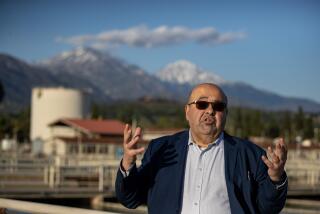Political Harm to Peres Feared Over Pipeline
- Share via
WASHINGTON — State Department officials are deeply concerned that disclosure of classified documents crucial to the investigation of Atty. Gen. Edwin Meese III could inflict serious political damage to Israeli Foreign Minister Shimon Peres, widely viewed as the United States’ major hope for a breakthrough in Middle East peace efforts, government sources have told The Times.
Although State Department officials vary in their assessments of the impact, one source said that “there’s more concern about Peres than Meese in the (U.S.) bureaucracy. Officials are rallying around Peres, not Meese.”
Particularly sensitive, the sources say, is a September, 1985, handwritten letter from Peres to the attorney general on a proposed $1-billion Iraqi oil pipeline, a project that has become a primary focus of independent counsel James C. McKay’s investigation of Meese.
Peres’ Denial Cited
Peres, through spokesmen, has denied writing the letter, but government sources said McKay has obtained a copy of the correspondence and believes it to be genuine.
Concern about the possible effect on Peres has been a key factor in the delay of declassification of the documents, which officials originally had said would take place early last week. An interagency panel has decided to go forward with declassification procedures after initial objections by the State Department.
One official said Friday that the Meese investigation papers “are now in the final administrative stages of declassification. Everything’s being turned over to McKay. Nothing is being held back.”
While the contents of the classified letter to Meese could not be learned, some Administration officials said disclosure of the document, along with related papers, could significantly undermine the political standing of Peres, who was prime minister of Israel at the time of the correspondence.
Others viewed the impact as less severe, emphasizing that the letter does not mention any plan for making a payment from pipeline proceeds to Peres’ Labor Party or to the Israeli government. That proposal was cited in another pivotal document in the investigation, a 1985 memo to Meese from his longtime friend E. Robert Wallach, who was retained as a private attorney on the project.
Nevertheless, all of those familiar with the letter acknowledged that its disclosure would at least prove “politically embarrassing” to Peres. The letter is significant, sources said, because it confirms that Peres apparently had knowledge of at least some activities related to the pipeline deal cited in the memo from Wallach to Meese.
Peres has denied that he was ever offered or received money for not opposing the pipeline.
A ‘Protection Racket’
Under an arrangement outlined in Wallach’s memo, sources said, Israel was to guarantee that it would not interfere with the pipeline’s construction by Iraq, its longtime enemy. One former Administration official has said this arrangement smacked of a “protection racket.”
Although the letter might be damaging, some Administration officials said, Peres could suffer more from what they denounced as “double hearsay,” or third-hand accounts, put forth in the memo from Wallach to Meese. One who has read Peres’ letter and the Wallach memo said that “rantings” by Wallach about the project could prove most troublesome for the Israeli foreign minister.
Sources familiar with the investigation said the Wallach memo refers to Peres’ letter to Meese and discusses actions by then-National Security Adviser Robert C. McFarlane and Swiss oilman Bruce Rappaport, who retained Wallach to aid the pipeline project. Wallach sought the attorney general’s influence in obtaining a U.S. stamp of approval to lend political and financial stability for the pipeline.
Letter to McFarlane
McKay also has obtained a November, 1985, letter from Peres to McFarlane on the project, but sources familiar with this correspondence said it would prove less troublesome for the Israeli official than the letter to Meese.
A month after writing to Meese, sources say, Peres became further involved in the pipeline project when he met with the attorney general and Wallach at an Israeli Embassy reception in October, 1985. One source familiar with that contact said the three discussed the project for several minutes.
The diplomatic complications related to Peres’ involvement in the project form only one facet of the unfolding story of the pipeline plan. While State Department officials remain concerned about the international consequences of the affair, the investigation focuses on the possibility of criminal violations by Americans involved in the case.
The Foreign Corrupt Practices Act prohibits U.S. citizens from bribing foreign officials, and specifically requires the attorney general to take legal action to prevent a violation if it appears that one is about to occur. Meese did nothing about his knowledge of the Israeli payment plan, but it is not known whether he did anything that could be construed as illegal.
Inflammatory Statements
Meese’s lawyers plan to cite inflammatory statements by Wallach as part of their attempt to convince McKay that the attorney general is innocent of wrongdoing. The attorneys, discounting published reports that documents in the Meese investigation are “conspiratorial” in tone, say such allegations have arisen only because Wallach has an unusual way of writing memos.
“On perfectly innocent topics, he’ll use initials to refer to individuals--for no reason whatsoever,” Meese attorney James E. Rocap said of Wallach recently.
But one source offered two counterpoints to such attempts to minimize the issue:
One is that Wallach’s memos--regardless of the type of language he used--accurately describe actions by government officials and others involved in the pipeline project. The other is that Meese, after reading the 1985 Wallach memo, had sufficient confidence in his longtime friend to refer the pipeline matter to McFarlane.
Washington Bureau Chief Jack Nelson and staff writer Michael Wines contributed to this story.
More to Read
Sign up for Essential California
The most important California stories and recommendations in your inbox every morning.
You may occasionally receive promotional content from the Los Angeles Times.










